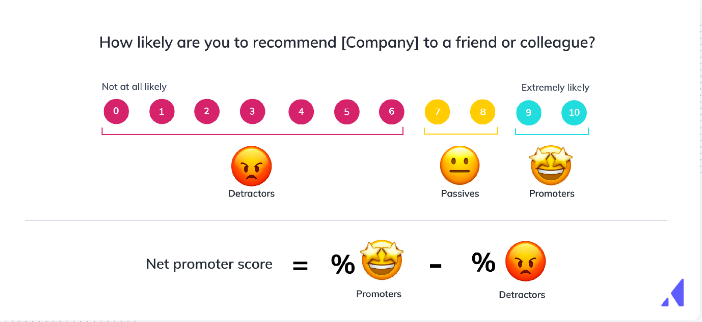What is NPS?
Learn what NPS is, how it's calculated and why you should use it as a metric.
Table of Contents
What is NPS?
NPS stands for Net Promoter Score and is used as a metric for customer experience. NPS is a designed system to measure an organization's performance through its customers' eyes by identifying promoters and detractors, and ultimately customer's loyalty to the company.
It asks one question:
- "On a scale of 0-10, how likely are you to recommend Company X to a friend or colleague?"
Respondents give a rating between 0 (not at all likely) and 10 (extremely likely). According to their responses, they'll fall into one of 3 categories:
- Promoters (9-10): Loyal, enthusiastic customers that will promote and advocate your services/product to friends and colleagues.
- Passives (7-8): Satisfied customers that aren't enthusiastic and could turn towards your competitors.
- Detractors (0-6): Unhappy customers that are unlikely to buy your services again and could damage your reputation by negative word of mouth.
NPS is not a customer satisfaction survey. Customer satisfaction surveys are usually sent to customers after an interaction with your company, such as after using a new feature or interacting with customer support. These are great to elicit short-time satisfaction with your services; NPS is used to determine long-term happiness with your services. These 2 two types of surveys are complementary. You can read more about creating surveys with Appcues here: Surveys & Forms.
How NPS is calculated
Your Net Promoter Score is the percentage of customers who are promoters (9 or 10) minus the percentage who are detractors (0 to 6). If 1200 people responded to your NPS survey and 400 (33%) are promoters, 600 are passives and 200 (16%) are detractors, your NPS score would be 17 (33%-16% = 17).
A Net Promoter Score can range from -100 (100% detractors) to 100 (100% promoters).

Benefits of collecting NPS
The goal with NPS is to determine long-term happiness and loyalty to your services. Because of that, it's generally deployed quarterly, biannually, or annually. If used consistently, it gives you a general metric about the performance of your product and company for the customer's needs.
The NPS is an indicator of growth, or potential of growth, by comparing how many customers are actively promoting your services versus how many are promoting against them. Studies have shown that companies that achieve long-term profitable growth have an NPS score two times higher than the average company.
Collecting NPS also offers an opportunity to consistently compare how you're doing against your competitors. In this context, NPS Benchmarks are a great reference to help you understand your target market better. You're also able to view how your NPS is performing against different customer segments. This helps your team to focus on the goal of creating more promoters and fewer detractors.
If you're ready to start collecting NPS at your company, you can quickly set up your NPS with Appcues here.
To learn more about NPS Best Practices with Appcues, our documentation is a good resource: NPS Best Practices.
Need help getting your NPS set up? Please reach out to support@appcues.com and we're happy to help!